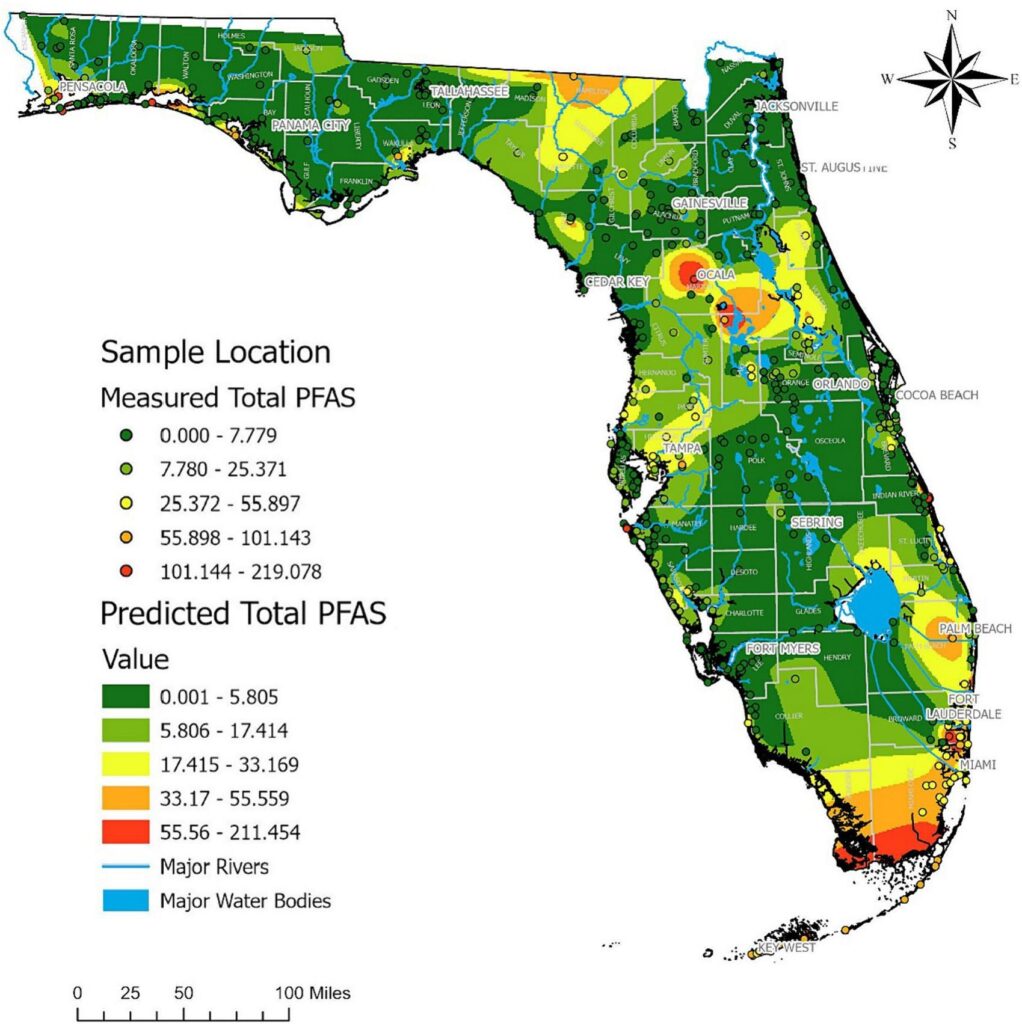By Katie Carpenter, Everwild Media
No matter which way you voted this fall, there’s one issue that unites us all. We need to drink water, and it should quench our thirst, not make us sick.
Here in Florida, years of neglect and regulatory rollbacks have left our drinking water supply vulnerable. Over time, our tap water has been contaminated with lead, pharmaceuticals, nitrates, pesticides and all kinds of bacteria, including the flesh-eating kind.
Yet PFAS, also known as forever chemicals, may be the hardest contaminants to combat. They persist in the environment for thousands of years, and when ingested, they build up in the human body over time.
These days, forever chemicals are being detected in drinking water all across Florida. They can come from consumer products such as non-stick cookware, fire-retardant clothing, stain-resistant carpeting, grease-resistant food packaging and more. These chemicals were created to be nearly indestructible, so they can easily flow from chemical spills to tap water without losing toxicity.

Not only are they forever chemicals, they seem to be becoming “everywhere chemicals.” A water-quality expert from the Center for Environmental and Human Toxicology at the University of Florida, John Bowden, warned that PFAS “will likely be one of the most significant pollution threats of our time” for a state like ours that relies so heavily on clean water for drinking and recreation and as a vital habitat for wildlife.
A recent case in South Florida caught some attention. Patrick Air Force Base in Brevard County was found to have substantial water contamination where PFAS-containing firefighting foam was used in hangars, fire stations and fire training areas. Then, in 2018, PFAS was found in the water of nearby Cocoa Beach.
Another South Florida city, Stuart, also detected PFAS in its water, at a level exceeding federal guidelines. Stuart’s city managers got millions of dollars from 3M as part of a class action settlement to pay for future water filtration facilities. They had to close 24 wells, and then pay for their PFAS waste to be shipped by barge to an out-of-state incinerator. Other cities in Florida have detected high levels of PFAS, and are considering joining the class action suit, including Titusville, Pensacola and Lakeland.
Few of the residents in my town had heard of forever chemicals, but they’d heard of actors Mark Ruffalo and Anne Hathaway. When the movie “Dark Waters” played earlier this year at a local screening, people here were alarmed. They wondered if these chemicals, which they saw kill cows and sicken people up on screen, could be right here where we live.
In response to our worry, a scientist from UF included us in a statewide water testing study. Out of an abundance of caution, my neighbors and I participated in his citizen-science project called “Crowdsourcing Water Quality in Florida.” We collected samples from our faucets very carefully with our latex gloves, then sent the sample bottles in dry ice by Fed Ex to his lab at the UF campus in Gainesville.
They gathered samples from homes all over the state, and found high levels of PFAS to our north and south, including in Miami and West Palm Beach.
The EPA established an MCL (Maximum Contaminant Level) of 4 parts per trillion for six of the forever chemicals. But there are thousands of different forever chemicals, and for some, the rule is enforceable, while for others, it’s just a “minimum reporting level.” At 4 ppt, local water treatment facilities are required to admit that the chemicals are present, but those facilities managers are always not keen to be candid about that, since expensive upgrades would surely be required.

People may not care much about fluoride, but when you mention that forever chemicals in their water can cause kidney, prostate and testicular cancers, as well as liver disease, high cholesterol and a reduction in the ability of the immune system to fight infections, they usually listen up.
“I think people are going to be very upset,” said Erik Olson, head of environmental health at the Natural Resources Defense Council. Olson is getting complaints already from Americans who are increasingly anxious with all the deregulatory rhetoric they’re hearing, saying “Look, I didn’t vote for toxic chemicals in my water.”
To protect clean water, we need a stronger Environmental Protection Agency with enforcement capabilities, as well as better-funded local utilities. There is growing anxiety that neither will be enabled by the next administration.
If you’d like clean drinking water for you and your family, pay close attention to what is happening with appointments to the EPA, the Centers for Disease Control and Prevention, and other agencies. Please speak up and let them know that not all regulations are bad. People of all political stripes need to drink clean water.
Katie Carpenter is a West Palm Beach-based filmmaker with Everwild Media (www.everwildmedia.com), producing documentaries about conservation, climate change and solutions. Banner image: A water sample being taken from a tap (iStock image).
Sign up for The Invading Sea newsletter by visiting here. To support The Invading Sea, click here to make a donation. If you are interested in submitting an opinion piece to The Invading Sea, email Editor Nathan Crabbe at ncrabbe@fau.edu.



